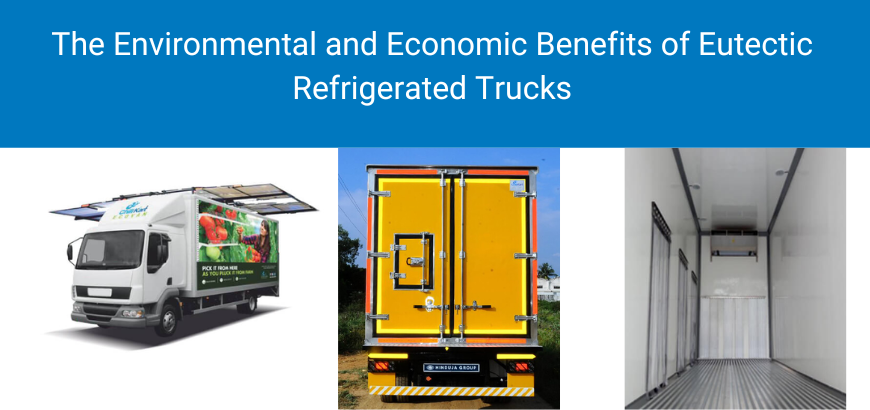The Environmental and Economic Benefits of Eutectic Refrigerated Trucks

Admin
December 6, 2023


December 6, 2023

Refrigeration is a vital component of the cold chain in preserving the freshness and quality of perishable products including fruits, vegetables, dairy, meat, and seafood. However, the cold chain sector is a major consumer of energy, accounting for 30% of total energy consumption worldwide. It comes as no surprise that refrigerated transport is responsible for 60% of the total cost in cold chain logistics and is predominantly powered by diesel-driven mechanical vapour compression systems. With the refrigerated transport sector consuming approximately 15% of fossil fuel energy globally, there is an urgent need to explore and adopt more sustainable and efficient technologies. Here, eutectic refrigerated trucks emerge as a promising alternative, offering both environmental and economic benefits.
Let us dive deeper.
In cold chain logistics, diesel-driven mechanical vapour compression is the primary refrigeration system used. It utilises R404A as the refrigerant which finds extensive use in low-temperature applications. Owing to the wide range of operating conditions, the mobile refrigeration system has a significantly low coefficient of performance (COP: 0.5 to 1.75) which results in higher diesel consumption and more carbon dioxide emission. Other refrigerants which are commonly used in refrigerated transport such as R134A and R417B have also been known to have a significant impact on global warming.
| Refrigerant | R404A | R134A | R417B |
| Global Warming Potential (GWP) | 3,922 | 1,430 | 3,027 |
Of these, refrigerant R404A is predominantly used in frozen food applications. These refrigerants are, therefore, already being phased out in many developed countries.
Additionally, when compared to stationary refrigeration systems, on-board refrigeration systems carry an additional risk of refrigerant leakage due to vibrations during transit. With such leaks not only the energy efficiency of the system is reduced but there is also a need for regularly refilling the refrigerant.
The refrigerated transportation sector is facing an uphill task of adopting new environment-friendly technologies that can help reduce carbon footprint. Adopting alternative refrigeration technologies, improving the energy efficiency of the refrigeration system, electrifying the refrigeration system using electricity from renewable energy sources, and using alternative fuels from renewable sources of energy can be the first few steps towards a bigger change.
Let us understand the different types of refrigeration systems used in transportation.
VCR is predominantly used in refrigeration systems used in refrigerated transportation. It comprises four elements.
Additionally, the four types of compressor drive methods include auxiliary diesel unit, direct belt drive, auxiliary alternator unit, and vehicle alternator unit. Large and medium refrigerated vehicles utilise auxiliary diesel engine-driven systems whereas the remaining find use in small vans and tucks.

Image source: Electrifying the Cold Chain
Cryogenic refrigeration utilises liquid nitrogen (LN2 at 3 bar) or liquid carbon dioxide (LCO2 at 8.6 bar) for low temperatures. The three types of cryogenic systems include the following.
When compared to VCR systems, cryogenic systems offer many benefits—very low noise, low energy consumption, low environmental impact, and rapid pull-down of temperatures. However, high upfront costs have limited its adoption.
In eutectic refrigeration, latent thermal energy storage utilises phase change materials (PCMs). These systems can store and release energy at the desired temperature, minimising temperature fluctuations and maintaining stable temperatures.
Usually, the eutectic solution is filled in flat, thin plates that are placed in the front and the roof of the truck to maximise space.

Image source: Electrifying the Cold Chain
Interestingly, the choice of eutectic solution and the number of plates is dependent on the required temperature and the refrigeration load. Usually, the refrigeration system is charged using electricity when the truck is not operational. During the time of charging, the eutectic solution freezes and stores energy. This stored energy is used via convection and radiation during transit to maintain low temperatures.
Eutectic refrigerated trucks offer significant advantages over vehicles with diesel-powered systems.
In response to the environmental and energy challenges posed by reefer trucks, Rinac has ingeniously introduced ChillKart, eutectic refrigerated trucks tailored for secondary transport and final-mile deliveries.
ChillKart is versatile, catering to a range of industries such as frozen and fresh produce, seafood, pharmaceuticals, frozen poultry and meat, horticultural items, dairy products, including frozen ice cream, and more.
Rinac offers two versions of ChillKart to support different refrigeration needs.


Here’s why businesses favour ChillKart
Additionally, Rinac provides bespoke features such as strip curtains, side doors or product chutes, internal lighting, shelving systems, and multi-temperature functionalities.
Eutectic refrigerated trucks present a viable and sustainable alternative to traditional diesel-powered refrigerated transport systems. This aligns with the global shift towards reducing carbon emissions and fostering economic sustainability. By embracing this technology and overcoming the associated challenges, the refrigerated transport sector can significantly reduce environmental impact while ensuring the integrity of the cold chain and the quality of perishable goods.
To know more about how ChillKart can support your business, get in touch with us today!